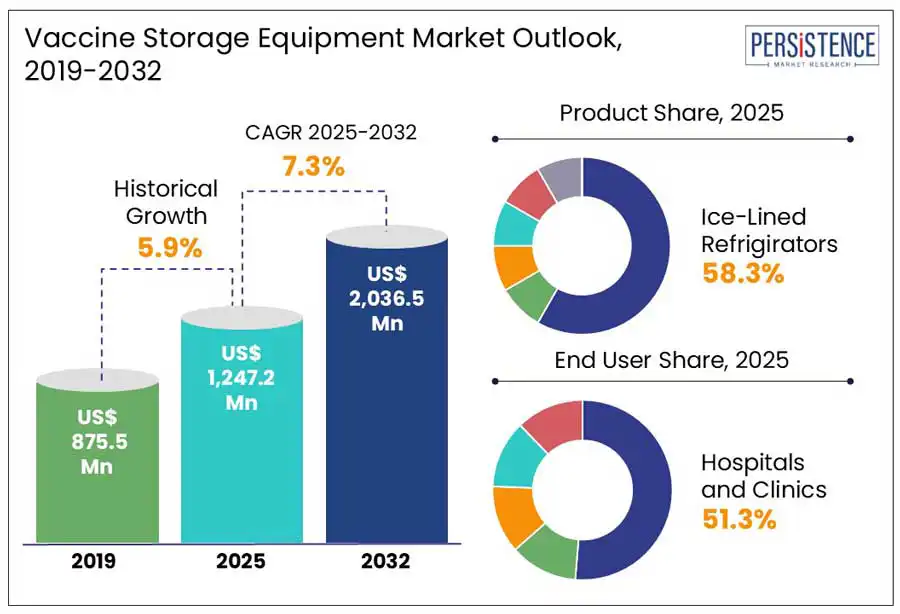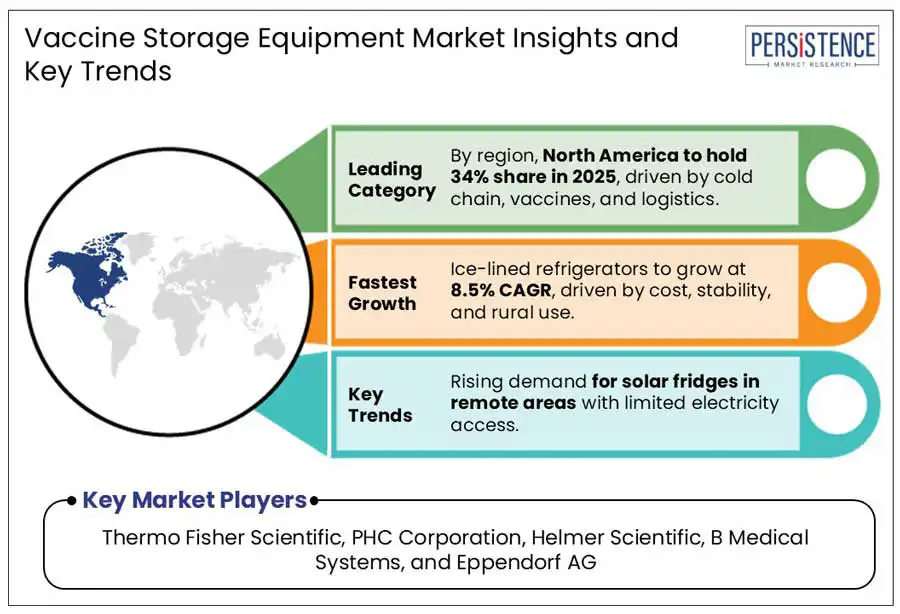Comprehensive Snapshot of Vaccine Storage Equipment Market Research Report, Including Regional and Country Analysis in Brief.
Industry: Healthcare
Published Date: April-2025
Format: PPT*, PDF, EXCEL
Delivery Timelines: Contact Sales
Number of Pages: 200
Report ID: PMRREP35239
The global vaccine storage equipment market size is expected to grow at US$ 1,247.2 Mn in 2025 to US$ 2,036.5 Mn with a staggering CAGR of 7.3% by 2032. According to the Persistence Market Research report, the rising immunization programs, increasing vaccine demand, and advancements in cold chain logistics propel growth. The government-authorized clinical organizations are investing in various types of equipment, such as deep freezers, solar-powered refrigerators. For instance, according to the UNICEF report 2024, Gavi, the vaccine alliance, provided US$23.4 million to support immunization for children living across the country, and over US$ 250 million+ investments in vaccine storage and distribution improvements.

Key Industry Highlights:
|
Global Market Attribute |
Key Insights |
|
Vaccine Storage Equipment Market Size (2025E) |
US$ 1,247.2 Mn |
|
Market Value Forecast (2032F) |
US$ 2,036.5 Mn |
|
Projected Growth (CAGR 2025 to 2032) |
7.3% |
|
Historical Market Growth (CAGR 2019 to 2024) |
5.9% |
Expanding immunization programs have significantly increased the demand for vaccine storage equipment. Global initiatives spearheaded by WHO, UNICEF, and Gavi accelerate the efforts to distribute vaccines, necessitating effective cold storage and transportation to maintain vaccine efficacy.
The emergence of new vaccines, including those for COVID-19, HPV, and pneumococcal diseases, has increased the demand for temperature-sensitive storage solutions such as ultra-low temperature freezers and refrigerators. For instance, during the pandemic caused by COVID-19, the distribution of mRNA vaccines (Pfizer-BioNTech and Moderna) required ultra-low temperature freezers (between -70°C and -20°C), resulting in a heightened demand for specialized storage units globally. Countries have invested in cold chain infrastructure, exemplified by Pfizer's collaboration with United Parcel Service (UPS) to create freezer farms in the U.S. and UNICEF's efforts to supply cold storage units to low-income countries.
The absence of uniform infrastructure in rural areas hinders the vaccine storage equipment market. Power outages disrupt essential cold storage, making it difficult to uphold the required temperature ranges for various vaccines. Furthermore, inadequate cold chain logistics, poor road connectivity, and insufficient trained personnel result in significant vaccine wastage. Geographical barriers in remote locations delay maintenance and contribute to equipment malfunctions, causing inefficiencies in vaccine distribution.
Consequently, governments and NGOs significantly invest in expensive backup systems. Proposed solutions, such as solar-powered refrigerators, mobile cold chain units, and partnerships between public and private sectors, could address these issues. Rectifying infrastructure gaps is essential for enhancing vaccine accessibility and promoting market expansion in these underprivileged regions.
The mobile logistics management information system (LMIS) transforms the vaccine storage equipment industry by improving cold chain efficiency and enabling real-time monitoring. Mobile LMIS enhances inventory management and supports predictive analytics, promoting IoT-enabled and solar-powered vaccine storage solutions, particularly in remote regions.
Backed by government initiatives and immunization programs, these innovations offer significant growth potential for manufacturers to create energy-efficient, digitally integrated vaccine storage systems, thereby enhancing global healthcare access. For instance, in October 2024, Indonesia introduced the SMILE e-LMIS, a collab between various government organizations and an innovative electronic logistics management information system (e-LMIS). This system has begun by tracking the distribution and inventory of vaccines for the nation's immunization initiative.
The ice-lined refrigerators segment is anticipated to grow with a remarkable CAGR of 8.5% during the forecast period. Ice-lined refrigerators (ILRs) are the top vaccine storage equipment due to their stability, cost-effectiveness, and widespread use in immunization programs, especially in developing and rural areas. They maintain stable temperatures (2°C to 8°C) even during power outages, ensuring vaccine potency. They are preferred by global organizations such as WHO and Gavi. The affordability, reliability, and government-backed adoption strengthens their market dominance in low and middle-income countries with limited healthcare infrastructure. For instance, in February 2021, Blue Star Limited introduced a new range of commercial refrigeration products, including ILRs designed to maintain temperatures between +2°C to +8°C, even during power outages of up to 48 hours.
Hospitals and clinics drive the vaccine storage equipment market due to their large-scale procurement power and responsibility for national immunization programs. They manage bulk purchases of ILRs, walk-in coolers, and deep freezers to maintain an uninterrupted cold chain, ensuring vaccine efficacy. Governments worldwide allocate budgets to strengthen cold chain logistics and partner with international organizations to expand vaccine storage capacity in underserved regions. UNICEF and WHO procured over 70,000 vaccine refrigerators for hospitals and healthcare centers in Africa, Asia, and Latin America under the COVAX initiative. The market for government health departments is likely to grow with a 9.7% CAGR between 2025 and 2032.

North America is projected to dominate the vaccine storage equipment market with 34.1% value share in 2025 and is estimated to grow at a CAGR of close to 6.3% over the forecast period. This is due to rapid investments in adopting various types of storage systems, such as increasing adoption of ultra-low temperature storage solutions and solar-powered vaccine refrigerators. The government is also taking the initiative to adopt such automation, which is eventually benefit vaccine efficacy. In 2023, the U.S. government, represented by the United States Agency for International Development (USAID) reaffirmed its strong commitment to the health sector in Guyana as Ambassador Nicole D. Theriot donated 13 solar-powered vaccine refrigerators to the Ministry of Health. These advanced units, valued at US$160,000 are directed for use in healthcare facilities located in Guyana's remote regions.
The governments in the Asia Pacific, spearheaded by India, are advancing through Electronic Vaccine Intelligence Network (eVIN). This digital solution allows for the real-time tracking of vaccine storage, which minimizes waste and enhances distribution. Investments are made in solar-powered refrigerators, IoT-enabled cold storage solutions and temperature loggers to improve vaccine delivery, particularly in remote locations.
Europe vaccine storage equipment market is predicted to grow with 6.7% CAGR by 2032. The European Union largely focuses on healthcare resilience by donating vaccine refrigerators, generators, and cold-chain transportation to various countries. In 2024, in collaboration with UNICEF, the European Union donated essential vaccine storage equipment, including 11 refrigerators, power generators, and a refrigerated vehicle to Montenegro’s Primary Healthcare Centre in Podgorica. This initiative aims to strengthen the country’s immunization efforts, particularly in response to declining routine vaccination rates and the risk of measles outbreaks.
The global vaccine storage equipment market is extremely competitive with leading companies prioritizing technological innovations, strategic partnerships, and the expansion of their capacities to bolster their market presence. The company also focuses on advancements in ultra-low temperature freezers, solar-powered refrigerators, and IoT-enabled storage solutions to address the increasing need for effective vaccine preservation.
|
Report Attributes |
Details |
|
Historical Data/Actuals |
2019 - 2024 |
|
Forecast Period |
2025 - 2032 |
|
Market Analysis Units |
Value: US$ Bn, Volume: Units |
|
Geographical Coverage |
|
|
Segmental Coverage |
|
|
Competitive Analysis |
|
|
Report Highlights |
|
|
Customization and Pricing |
Available upon request |
By Product
By End-user
By Region
To know more about delivery timeline for this report Contact Sales

The market is estimated to be valued at US$ 1,247.2 Mn in 2025.
Increasing global emphasis on immunization programs and the need for effective cold chain management are the key demand drivers for the vaccine storage equipment market.
In 2025, North America is expected to dominate the global market.
Among products, preference for ice-lined refrigerators segment is expected to grow rapidly from 2025 to 2032.
Thermo Fisher Scientific, PHC Corporation, Helmer Scientific, B Medical Systems, and Eppendorf AG are the leading players in the market.